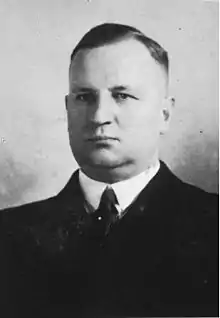Harry Haffner
Harry Haffner (28 May 1900 – 14 October 1969) was a German lawyer and the last Judge-President of the Nazi People's Court.
Harry Haffner | |
|---|---|
 | |
| Judge President of the People's Court | |
| In office 12 March 1945 – 24 April 1945 | |
| Preceded by | Roland Freisler |
| Succeeded by | Position abolished |
| Personal details | |
| Born | 27 May 1900 Uslar, Lower Saxony |
| Died | 14 October 1969 Hornberg, West Germany (aged 69) |
Haffner was born in Uslar, Lower Saxony. He graduated in law in 1926 and worked as a prosecutor. He joined the Nazi Party and SA on 1 May 1933. Haffner was then Chief of Staff at the National Socialist Association of Legal Professionals and Zellenleiter of the NSV. In 1934, he was appointed a prosecutor in Celle, and in 1936 he was appointed senior prosecutor to the Prosecutor General of Kassel. In 1938, he was a representative of the General Prosecutor in Hamm. On 1 January 1944, Haffner became the General Prosecutor of Katowice[1] in occupied Poland where the Auschwitz concentration camp fell within his remit – he visited the camp on 28 June 1944.
On 12 March 1945, following the death of Roland Freisler in an air raid, he succeeded him as the last Judge-President of the Volksgerichtshof (People's Court). He held this office until 24 April 1945 when the court finally ceased its activity only two weeks before the German surrender.
From 1946 he lived under the name of Heinrich Hartmann in the town of Sontra, where he ran a shop with his wife. In 1953, he turned himself in to the authorities in Kassel and the prosecutor made his past public, but the investigations against him were dismissed. He died in Hornberg, aged 69.
Sources
- Koch, Hanns Joachim Wolfgang (1997). In the name of the Volk: political justice in Hitler's Germany. I.B.Tauris. pp. 226, 227. ISBN 1-86064-174-1.
References
- Klee, Ernst (1986). Was sie taten, was sie wurden: Arzte, Juristen und andere Beteiligte am Kranken- oder Judenmord. Fischer Taschenbuch. p. 265. ISBN 3-596-24364-5.
| Legal offices | ||
|---|---|---|
| Preceded by Roland Friesler |
Judge President of the People's Court 12 March – 24 April 1945 |
Succeeded by position abolished |